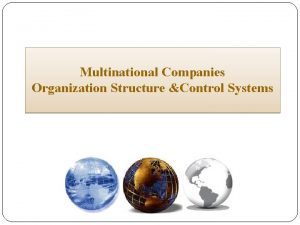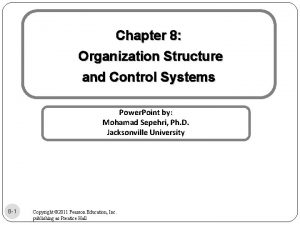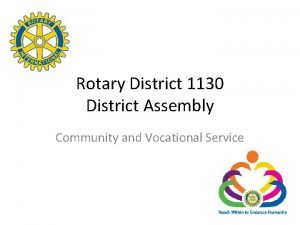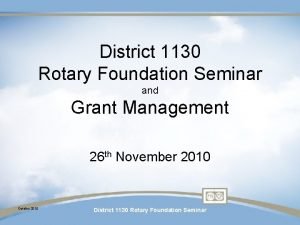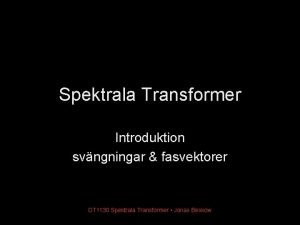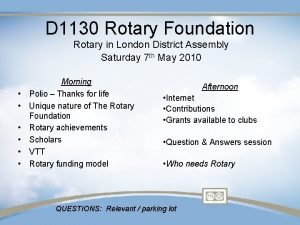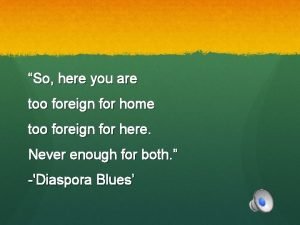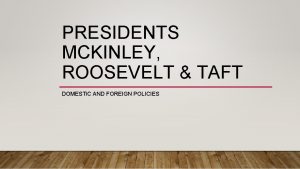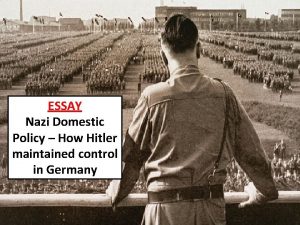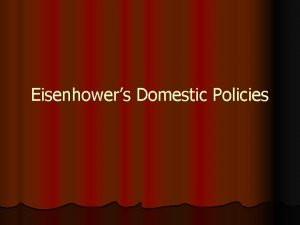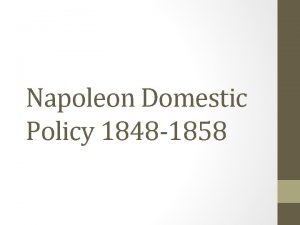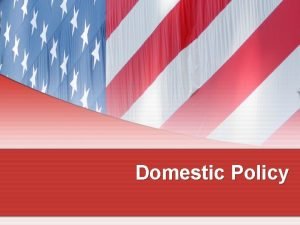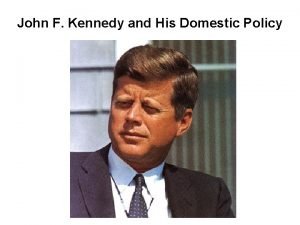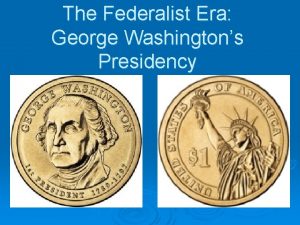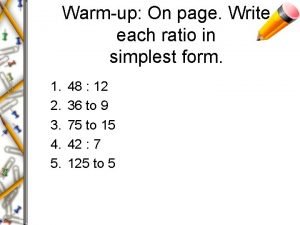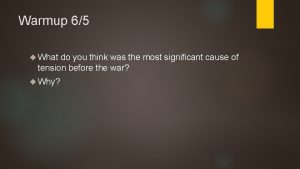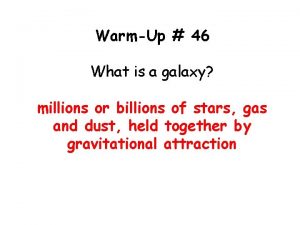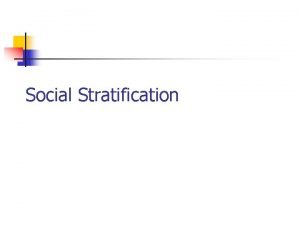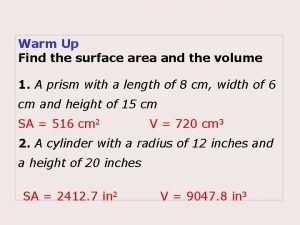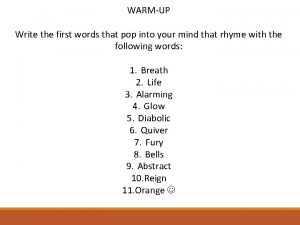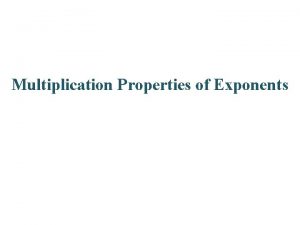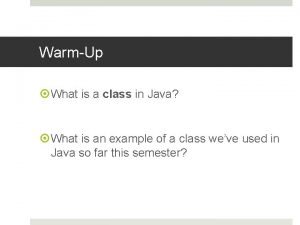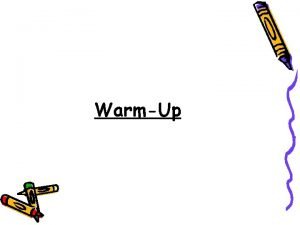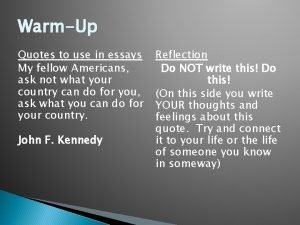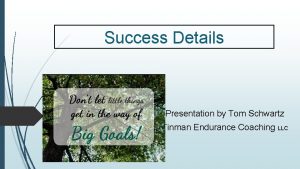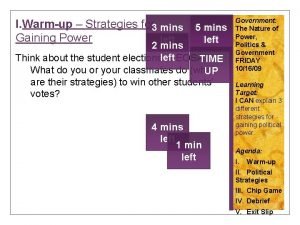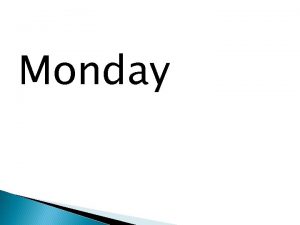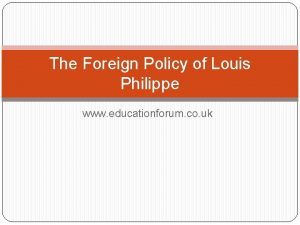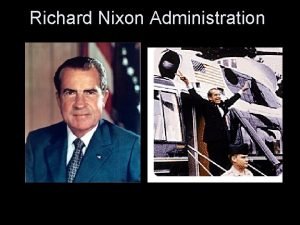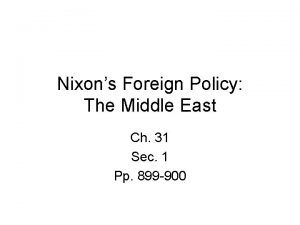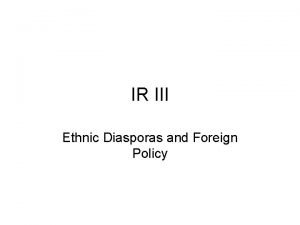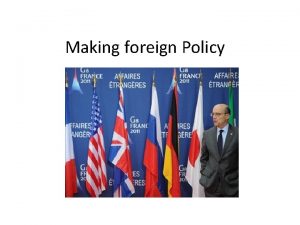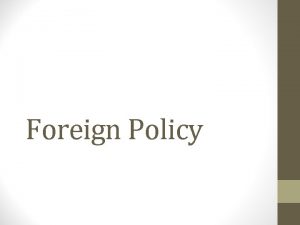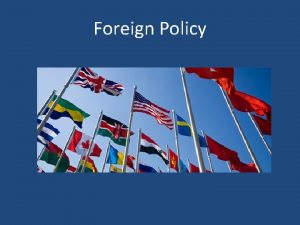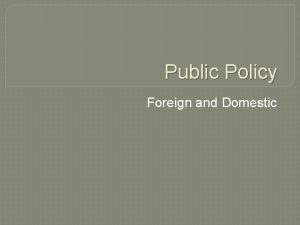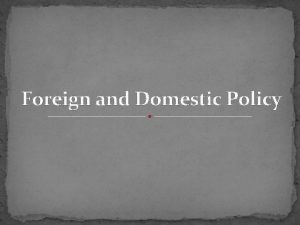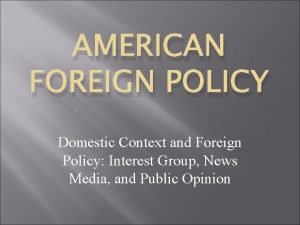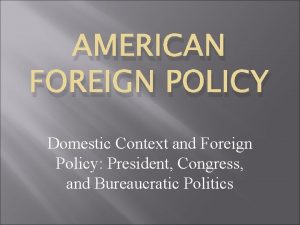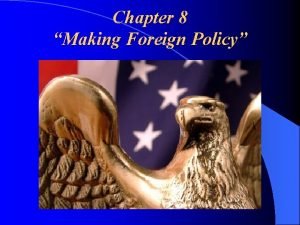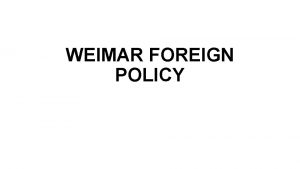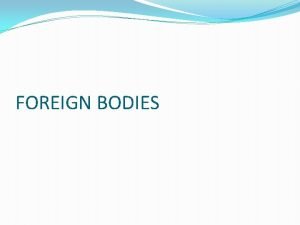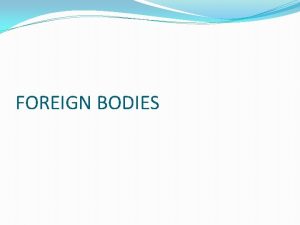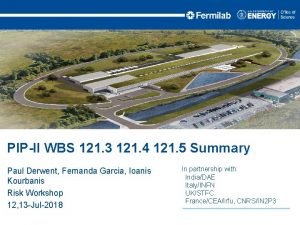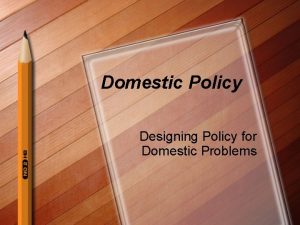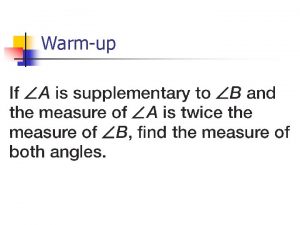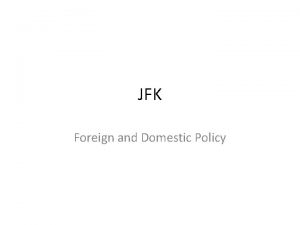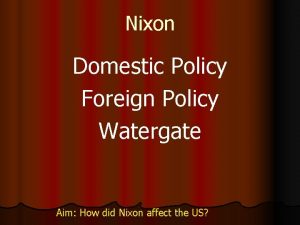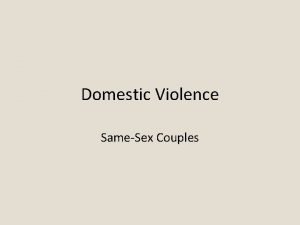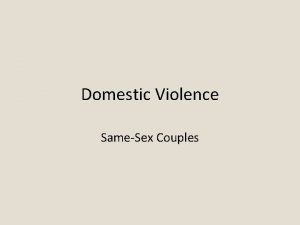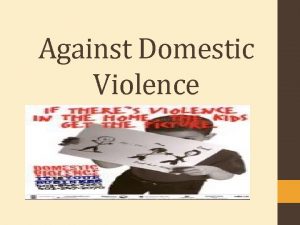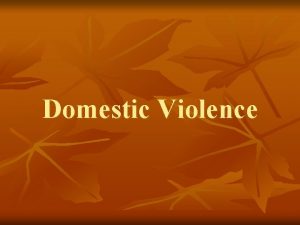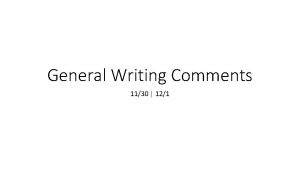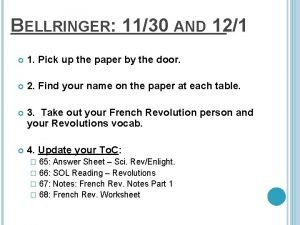DOMESTIC FOREIGN POLICY 1130 121 WARMUP What does





































- Slides: 37

DOMESTIC & FOREIGN POLICY 11/30 – 12/1

WARMUP • What does “nonproliferation” mean? • To prevent an increase or spread of something, especially nuclear weapons

AGENDA • • Unit 6 Vocab Quiz Power. Point with notes Test = December 8 th – 9 th PAC Projects DUE December 14 th (C-Day)

DOMESTIC POLICY • Domestic policy = administrative decisions that are directly related to all issues and activities within a nation’s borders

DOMESTIC POLICY • Domestic policy includes: • Agriculture, commerce, drugs (legal and illegal), the economy/money, education, energy, the environment, food, health, housing, immigration, language, the military, science, and society/culture • It affects how every person lives in their country every day

DOMESTIC POLICY • The concept of domestic policy has existed since before nations were created • Monarchs and emperors ruled over their lands and decided what they wanted for their people • Domestic policy is shaped by societal changes, which are reflected into law

DOMESTIC AND SOCIAL POLICY • • • Business and Labor Agriculture, the Environment, and Energy Income Security and Health Care Education, Housing, and Transportation Citizenship and Immigration

BUSINESS AND LABOR

THE ECONOMY • One of the government’s most important responsibilities is to manage the nation’s economy • Mixed economy = a combination of capitalist and socialist business practices where the government regulates private businesses • Capitalist economic freedom and socialist government regulation

FREE TRADE • The US supports businesses by promoting free trade • Free trade = the sale of products between countries without tariffs (import taxes) and with no limit on the amount of goods that can be imported • NAFTA = the North American Free Trade Agreement • Signed by the US, Canada, and Mexico in 1992 • Designed to gradually eliminate trade restrictions between those three countries

BUSINESS • Monopoly = • Trust = a board of trustees and they operate as one giant enterprise.

LABOR • Union = an organized association of workers, often in a trade or profession, formed to protect and further their rights and interests • The first successful national labor organization was the American Federation of Labor (founded in 1880 s) • New Deal = FDR’s legislation strengthened labor unions and protected their right to bargain and to strike

LABOR • Closed shop = only members of a union can be hired • Right-to-work laws = state labor laws that requires all workplaces to hire workers without forcing them to join a union • Businesses don’t have to hire only union workers • President Ronald Reagan was one of the most anti-labor union presidents in history • Impact = labor unions weakened as membership declined, tens of thousands of people were laid off, corporations demanded lower wages, and blue-collar jobs decreased from 36% to 25%

AGRICULTURE, THE ENVIRONMENT, AND ENERGY

FARMERS • By 2007, less than 10% of the US’s farms produce more than 60% of agricultural products • • Machinery Fertilizers Pesticides GMOs • Farm policies are developed by the U. S. Department of Agriculture (USDA) • Functions = help farmers market their produce, stabilize farm prices, conserve land, and promote agricultural science research

FARMERS • Subsidy = a sum of money to assist an industry/ business so that the price of a commodity or service may remain low or competitive • Price supports = the program under which Congress buys farmers’ crops if the market price falls below the support price

THE ENVIRONMENT • The federal government began passing environmental legislation in the 1970 s due to concerns about rising energy costs • Environmental Protection Agency = EPA, created under Richard Nixon, enforces regulations to protect our environment

ENERGY POLICY • The U. S’s energy policy deals with issues on how energy is produced, distributed, and used by the people • Since the 1970 s, the U. S’s main focus has been how to secure a continuous supply of oil • Arab Oil Embargo (winter 1973 -1974): Arab countries cut off oil to the US because the US supported Israel during the Arab-Israeli War

ENERGY POLICY • Two new goals: increase oil production and protect the environment • Offshore drilling • Fracking

THE ENVIRONMENT • Renewable energy = energy that is collected from resources that naturally replenish on a human timescale • • • Wind Sunlight Tides/waves Rain Geothermal (volcanic activity)

THE ENVIRONMENT • Is this renewable energy? NO!

INCOME SECURITY AND HEALTH CARE

INCOME SECURITY • The federal government did not help people find food, health care, housing, etc. well into the 1900 s • The Great Depression changed that • President Roosevelt created Social Security in 1935 • Income security programs = help protect people against their loss of income due to retirement, disability, and unemployment

INCOME SECURITY • Social Security = a government system that provides financial assistance to people with an inadequate or no income • Unemployment insurance = a small source of income for workers who have lost their jobs (laid off) • If they quit or are self-employed, they do not receive unemployment insurance • Welfare = a government program which provides financial aid to individuals or groups who cannot support themselves • Welfare programs are funded by taxpayers

SOCIAL WELFARE • Food stamps = a voucher issued by the government to those on low income, exchangeable for food • Medicare = the federal health insurance program for people who are 65 or older, certain younger people with disabilities, and people with End-Stage Renal Disease (permanent kidney failure requiring dialysis or a transplant, sometimes called ESRD)

EDUCATION, HOUSING, AND TRANSPORTATION

PUBLIC EDUCATION • The first modern public school system was established in Indiana in 1816 • States have more authority over public education than the federal government

EDUCATION • Education policy covers preschool – 12 th grade, college/university, graduate school, professional education, adult education and job training • In the past 30 years, states and the federal governments have been increasing their role in shaping education • No Child Left Behind = President George W. Bush signed this act into law in 2002 • Massively increased the federal government’s role in education • States did not have to comply, but if they didn’t, they would lose federal funding • Repealed by Every Student Succeeds Act in 2015, which reduced the federal government’s role in education

HOUSING • The federal government has developed several programs to promote building and purchasing houses • Administered by the Department of Housing and Urban Development • Public housing = housing provided for people with low incomes, subsidized by public funds

TRANSPORTATION • The national government contributes to the development and maintenance of channels, locks, dams, canals, ports, highways, railroads, and airports • The Department of Transportation coordinates national transportation policies and programs • Federal Aid Highway Act of 1956 = states receive billions of dollars a year to build and improve the interstates • The federal government helps cities build mass-transit systems

THE MILITARY • Nonproliferation = To prevent an increase or spread of something, especially nuclear weapons or nuclear energy • Conscription = also called “the draft”, the forced assignment of people to join the military to fight, especially during a crisis

CITIZENSHIP AND IMMIGRATION

CITIZENSHIP • Citizen = a member of a political society • Citizenship = the expected qualities that a person should have as a member of a community • People born in the US are citizens regardless of the citizenship status of their parents (14 th Amendment) • A child born outside of the US to parents who are US citizens is also automatically a US citizen

NATURALIZATION • Naturalization = a legal process by which applications who meet certain qualifications may be granted citizenship. • Requirements = • 1) legal residency in the US for at least 5 years • 2) physical presence in the US for at least half of the past 5 years • 3) at least 18 years of age • 4) have a good moral character (jail = bad) • 5) the ability to speak, read, and write in English • 6) pass a citizenship test about U. S. history and the government • 7) swearing allegiance to the U. S. Constitution and loyalty to the US

NATURALIZATION • Congress has sole power over naturalization (states cannot give citizenship or take it away) • Quotas = numerical limits on how many people are allowed to immigrate from each country

IMMIGRATION • The Immigration Reform and Control Act (1986) tried to limit the amount of illegal immigration by requiring employers to verify that potential employees were qualified to work in the US • Amnesty = the act also allowed for amnesty, a presidential order that pardons a group of people who have committed an offense against the government • After 9/11, immigration policies dramatically shifted • • Terrorism Increased deportations Tighter border control Increase in technology

IMMIGRATION • The DREAM Act = Development, Relief, and Education for Alien Minors • • • Must have entered the US before age 16 Continuously lived here for 5 years Graduate from a US high school or get their GED Demonstrates good moral character Pass criminal background checks • President Obama created a controversial executive order that stops the deportation of young people who meet the DREAM Act requirements because the DREAM Act did not pass the Senate
 Mnc organizational structure
Mnc organizational structure Domestic structure plus foreign subsidiary
Domestic structure plus foreign subsidiary 1130 sat
1130 sat Amalienstraße 31-33
Amalienstraße 31-33 Rotary district 1130
Rotary district 1130 Rotary district 1130
Rotary district 1130 Dt 1130
Dt 1130 Rotary district 1130
Rotary district 1130 Too foreign for here too foreign for home
Too foreign for here too foreign for home William h taft domestic policy
William h taft domestic policy Hitler's domestic policy essay
Hitler's domestic policy essay Eisenhower's domestic policy
Eisenhower's domestic policy Napoleon bonaparte domestic policies
Napoleon bonaparte domestic policies Domestic policy meaning
Domestic policy meaning 12th amendment
12th amendment Queen hatshepsut domestic policy
Queen hatshepsut domestic policy Domestic policies of kennedy
Domestic policies of kennedy Domestic policy
Domestic policy George washingtons domestic policy
George washingtons domestic policy Warmup ratio
Warmup ratio Warmup 65
Warmup 65 Gmass warmup
Gmass warmup Status vs class
Status vs class Pyramid warmup
Pyramid warmup Warm rhyming words
Warm rhyming words Multiplication properties of exponents
Multiplication properties of exponents Java warmup
Java warmup Define:warmup
Define:warmup Pathos story
Pathos story Tom schwartz tinman
Tom schwartz tinman Warmup 65
Warmup 65 Warmup end
Warmup end 1790 foreign policy
1790 foreign policy Foreign policy of louis philippe
Foreign policy of louis philippe What was thomas jefferson foreign policy
What was thomas jefferson foreign policy Nixons foreign policy
Nixons foreign policy Nixons foreign policy
Nixons foreign policy Actors in foreign policy
Actors in foreign policy
